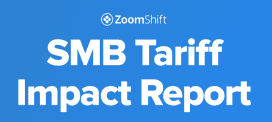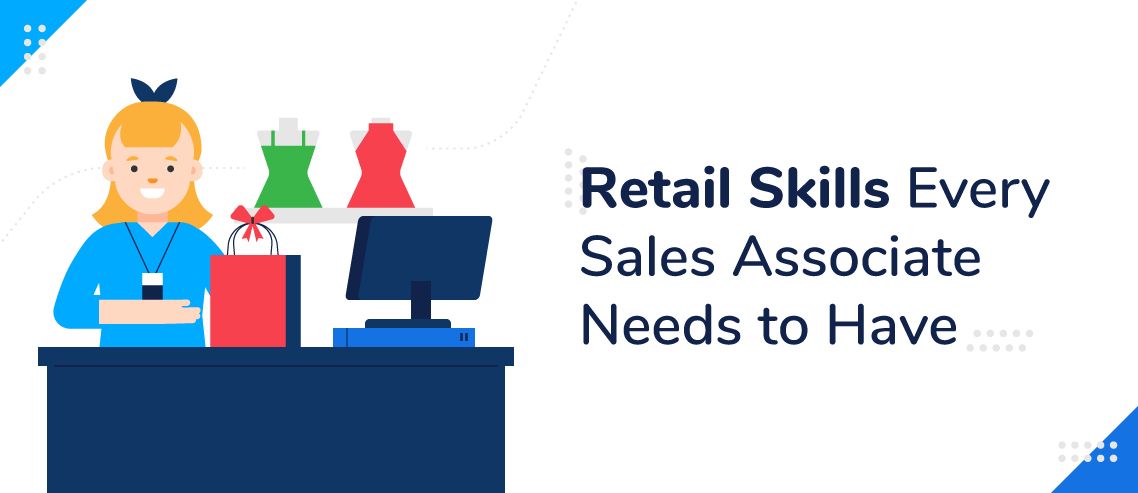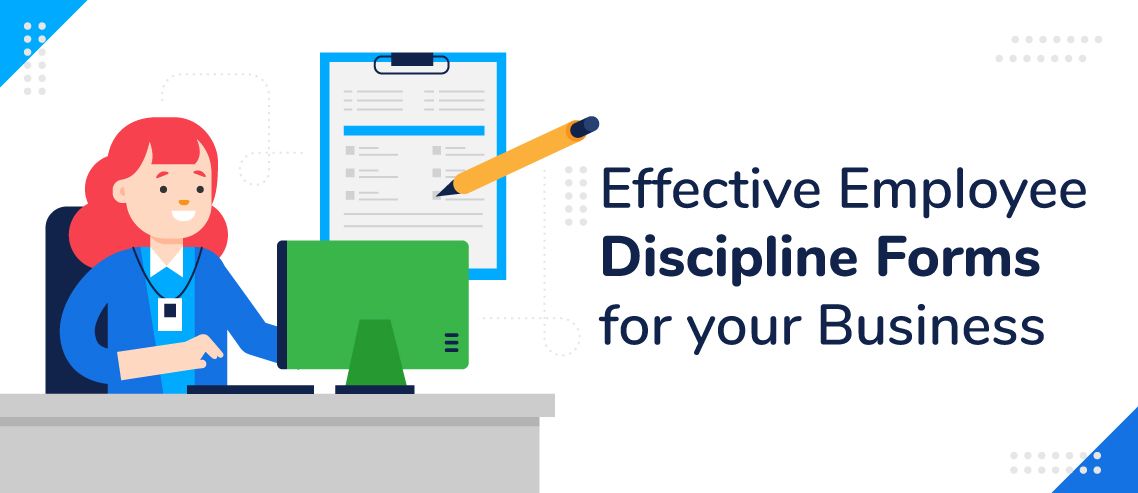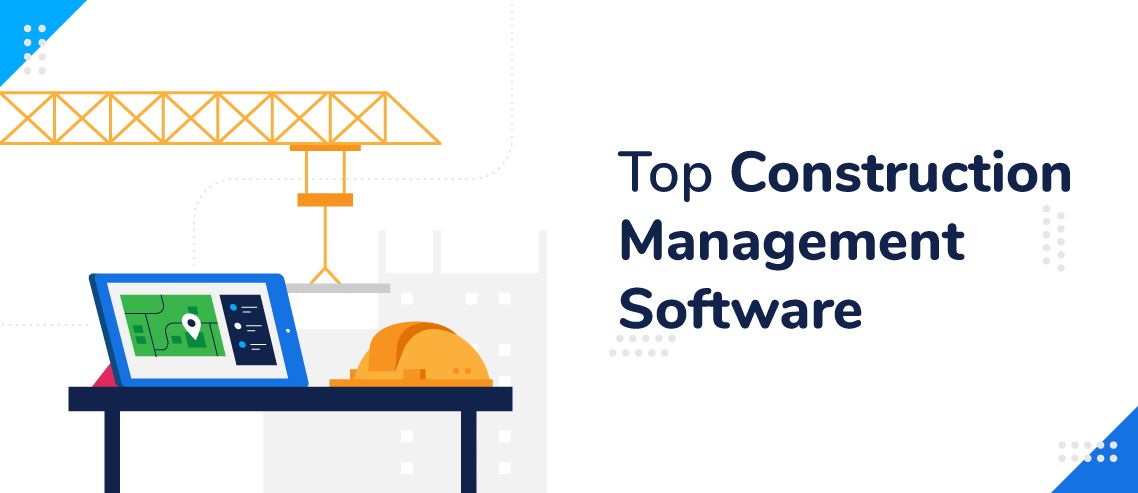AI & Jobs: Insights From a US Employee Survey 2024
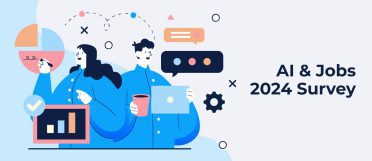
Artificial Intelligence (AI) has been looked upon with suspicion by a growing number of employees worldwide. As AI platforms like ChatGPT become capable of handling increasingly complex tasks, many fear that the technology will render them jobless.
To advance this question, ZoomShift conducted a survey of 1,027 entry-level and intermediate employees in the US in February 2024. The respondents included individuals aged 18 and above and of all genders.
The three primary concerns targeted by the survey include:
- The growing influence of AI in various industries
- Perspectives on AI’s impact on jobs, regulations, job satisfaction, income, and work ethic
- Understanding perceptions and experiences related to AI in the industry
Key Findings
Our survey suggested that while a majority of US workers view AI’s long-term impact on jobs in a negative light, few reported immediate impacts of the technology on their present industry. Interestingly, very few workers demonstrated a high level of knowledge of AI regulations.
The survey’s five key findings are:
- 66% of employees believe AI will ultimately destroy more jobs than it creates in their industry
- Only 5% of the people surveyed demonstrated a high level of familiarity with AI regulations
- 84% of employees reported AI has had no impact on their current job satisfaction
- 12.5% of respondents reported suffering loss of income due to the emergence of AI in their industry
- 65% of respondents think AI will make employees lazier in the future
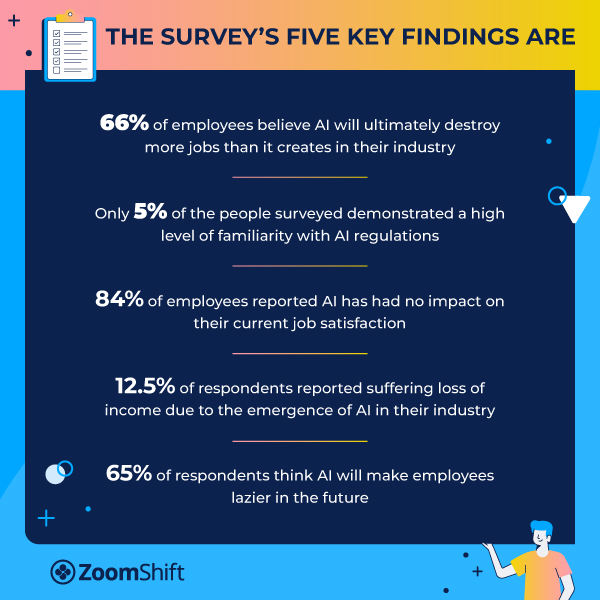
Q1: Awareness of AI Regulations
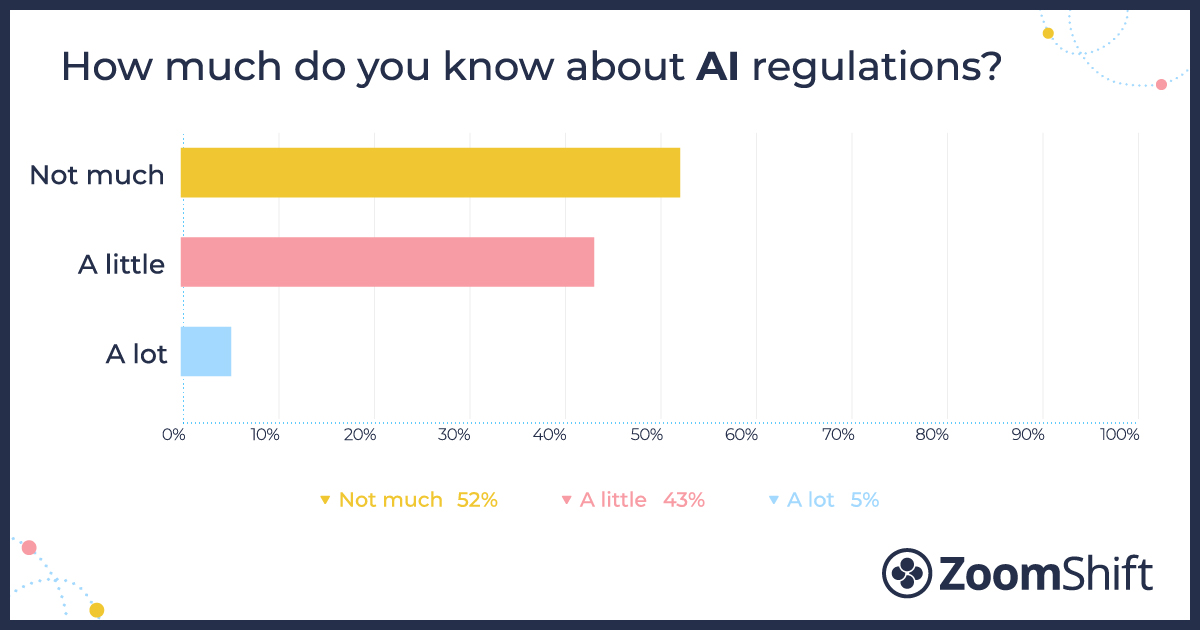
Participants were asked the question, “How much do you know about AI regulations?”
52% reported not knowing much about AI regulations. 43% reported having some knowledge, while only 5% reported knowing a lot.
Unsurprisingly, respondents with little knowledge of AI regulations formed the majority. This lack of awareness is concerning in a world where governments and organizations are increasingly troubled by the risks of using AI in the workplace.
Organizations like the European Union have taken the initiative to regulate AI use, giving a set of rules to ensure that AI systems are safe, transparent, traceable, non-discriminatory, and environmentally friendly. Additionally, when dealing with AI within the medical industry, getting AI models through FDA approval is essential.
These regulations are meant to ensure that AI remains a useful force for efficiency and growth in the workplace and remove risks such as misuse of personal data or biased/bad business decisions. Despite these measures, most employees remain unaware of important AI regulations, as reflected by our survey.
Businesses integrating AI into their operations should take initiative to educate employees about AI regulations and ensure compliance with such policies in their decision-making and operational functions.
Q2: The Job Market Perspective
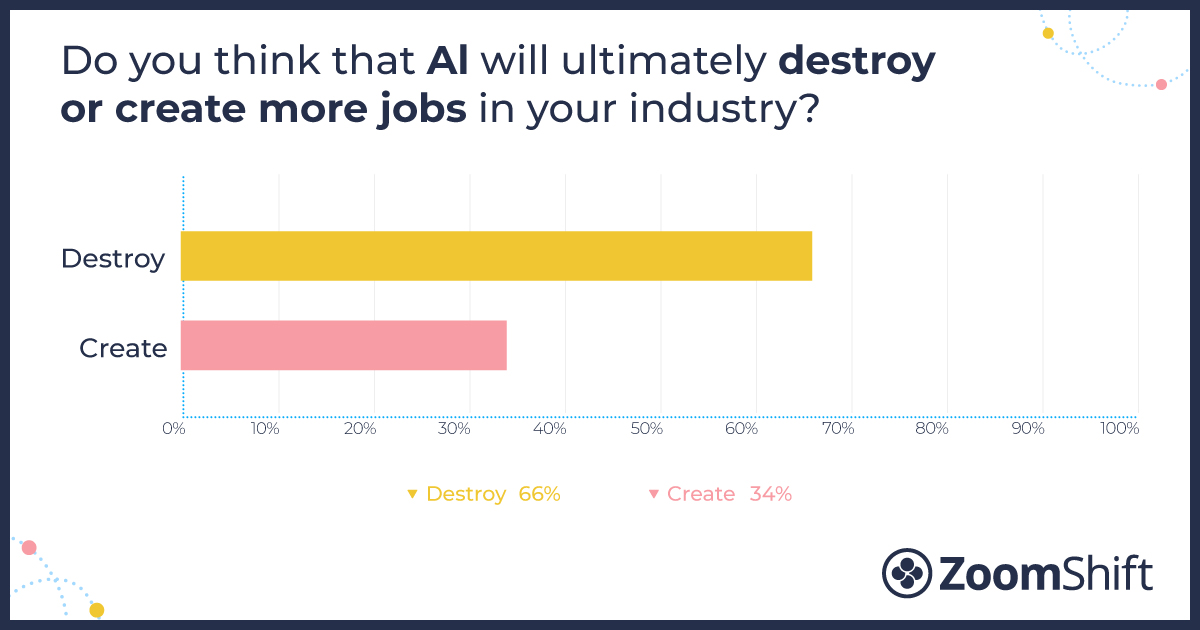
To determine workers’ views on the impact of AI on the future job market, we asked them the question, “Do you think AI will ultimately destroy or create more jobs in your industry?”
Out of the 1,027 responses, 34% thought AI would create more jobs, while the majority—66% —thought AI would destroy more of them. These numbers reflect a divergence in employee opinions and hint at deep-rooted employee unease toward AI integration in their industry.
While a large number of employees clearly fear AI integration, many professional forums have concluded that in the long term, AI automation will be a net positive for society. For instance, the World Economic Forum Future of Jobs Report estimates that AI will create at least 12 million more jobs than it displaces.
Similarly, a recent UN International Labor Organization study examined the potential effects of ChatGPT and other platforms on job quality and quantity. The study suggested that the question of whether AI creates or destroys more jobs is not so straightforward, highlighting that most industries and jobs are only partly exposed to automation.
It concluded that most jobs are more likely to be complemented rather than substituted by the latest wave of generative AI. The greatest impact of AI technology is therefore not likely to be job destruction but rather changes in the quality and nature of jobs.
However, the impact of AI on jobs will not be felt equally. The greatest impact is likely to be in high- and upper-middle-income countries due to a higher share of employment in clerical occupations. In addition, since women are over-represented in clerical jobs, the effects are likely to be highly gendered.
These findings raise important concerns about the discriminatory nature of AI’s potentially beneficial impact on the job market. They also offer potential explanations for the significant employee apprehension towards AI reflected in our survey.
In addition to concerns about job displacement, businesses can seek comprehensive insights into how AI platforms like ChatGPT are reshaping the landscape. For instance, platforms such as Octoboard specialize in providing automated updates on AI data trends and insights to help businesses navigate these emerging challenges efficiently. Their chatgpt insights offer valuable perspectives on leveraging AI technology for improved business operations and anomaly detection.
Q3: Job Satisfaction in the Age of AI
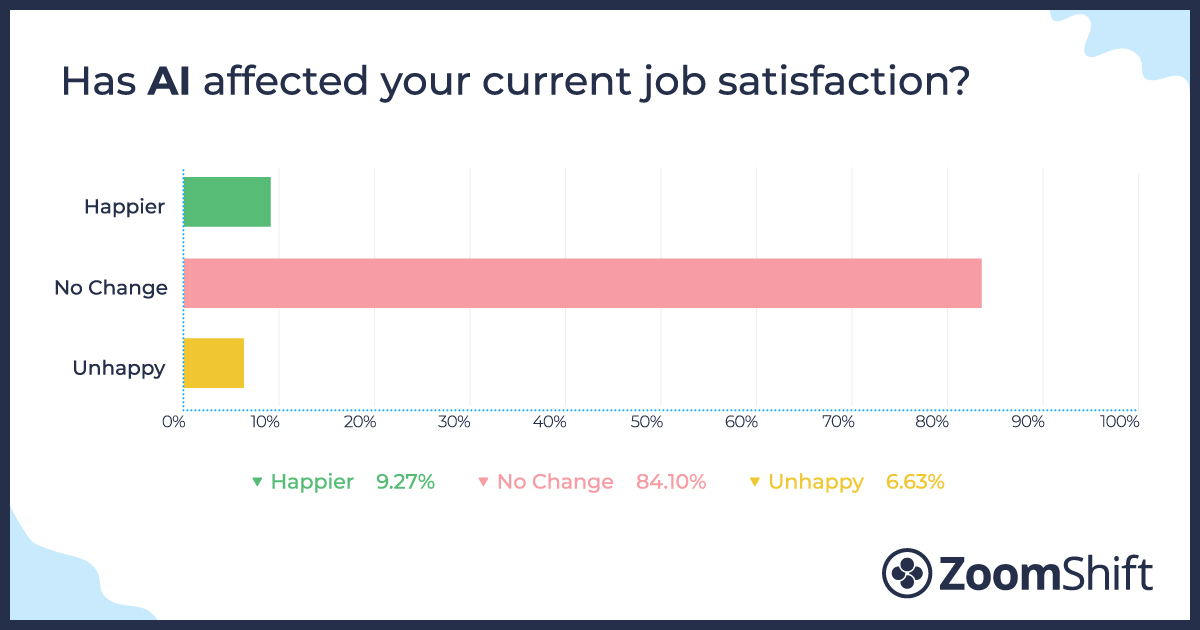
For the third question, we asked participants “Has AI affected your current job satisfaction?”
Just over 84% said AI did not affect their current job satisfaction. 95 respondents (9.27%) said AI made them happier at work, while 6% reported lowered satisfaction.
Whether AI integration makes employees happier or worse off at work can be due to a multitude of factors. For instance, workers with AI-specific skills may enjoy high wages and substantial wage premiums. At the same time, AI integration has a limited impact on wages or job satisfaction of individuals without AI-specific skills.
Another aspect of AI’s impact on job satisfaction is the fact that it changes the task composition of jobs. For instance, by automating more tedious, repetitive tasks and aiding employees in decision-making, AI can make a happier workforce. In some circumstances, AI can also improve autonomy in the workplace, such as control over the sequence in which workers perform tasks. This, however, depends on how AI is implemented and used.
Overall, AI’s impact on job satisfaction varies greatly but seems to remain limited for most individuals in our survey. Good policy-making can promote AI implementation in the workplace in a way that enhances job quality and boosts worker satisfaction.
Q4: The Financial Impact of AI
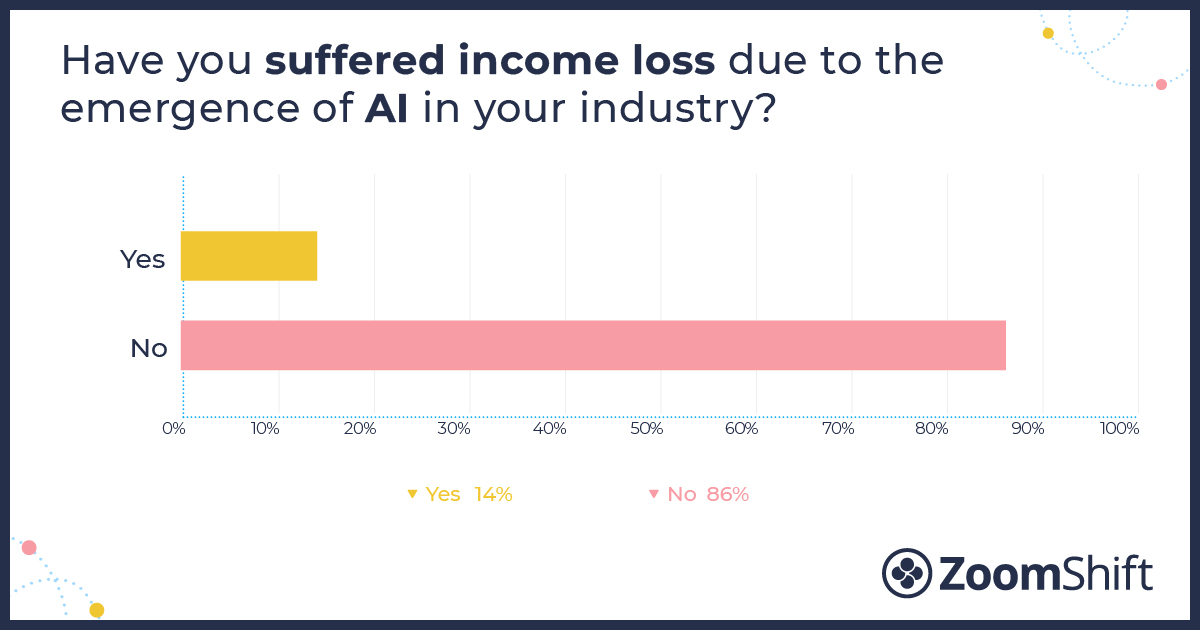
We next asked the question “Have you suffered income loss due to the emergence of AI in your industry?”
A clear majority— 86%—reported no income loss, while 141 respondents or 14% of respondents voted yes.
While a majority of our respondents did not suffer a loss of income due to AI integration, organizations like the International Monetary Fund and The Organisation for Economic Co-operation and Development (OECD) have expressed concern over AI’s impact on workers’ wages.
On one hand, managers and workers with tertiary degrees or AI-specific skills are enjoying higher wages. On the other, individuals without an AI background or adaptation to AI-specific skills may suffer a loss of income.
AI systems may also struggle with bias, which may reflect in wage-based discrimination against disadvantaged groups. While bias is widespread in human decisions as well, the use of biased AI systems presents the risk of systemizing and multiplying it. This can counter inclusivity in the workplace, negatively impacting disadvantaged or underrepresented groups in certain industry sectors.
Such risks can be countered through targeted policy implementation. For instance, some OECD countries enable workers to opt out of full automation by allowing them the right to meaningful human input for important decisions that affect them and their conditions in the workplace.
Another risk is that AI applications may execute key tasks currently performed by humans, which could lower labor demand, leading to lower wages and reduced hiring. In extreme cases, these jobs may disappear entirely.
To counter these challenges and adapt to AI-driven changes, companies should implement agile workplace training systems to help workers benefit from AI. They can introduce special skills and training programs with particular attention placed on the broader proliferation of AI in the workplace.
Q5: Perceptions of Work Ethics and AI

To determine participant perceptions of work ethic and AI, we asked them the question, “Do you think AI is going to make employees lazier in the future?”
66% thought AI will make employees lazy, while 34% voted no.
The majority of respondents in our survey reflect a widespread sentiment—while AI has undoubtedly improved efficiency and convenience, there is growing concern that too much reliance on it in the workplace is making workers lazier.
This belief, combined with the increased surveillance of AI use in the workplace, is changing workplace dynamics and culture. For example, a significant number of workers are embarrassed to admit they’re using AI generative tools unless specifically endorsed by managers to do so.
With corporations like Apple and Morgan Chase banning the use of ChatGPT among staff, there’s a growing fear among employees that AI use makes them lazy, less valuable, and less creative, as reflected in our survey responses.
Plus, the speed with which AI has arrived and been taken up and the breadth of its capabilities are further feeding employee perception about its negative impact on work ethic.
At the same time, industries like technology and finance are more enthusiastic about educating their employees on AI use. These sectors are proving that a rewriting of company guidelines and reframing AI as a tool for innovation and a productivity aid can target negative perceptions and help reassure employees.
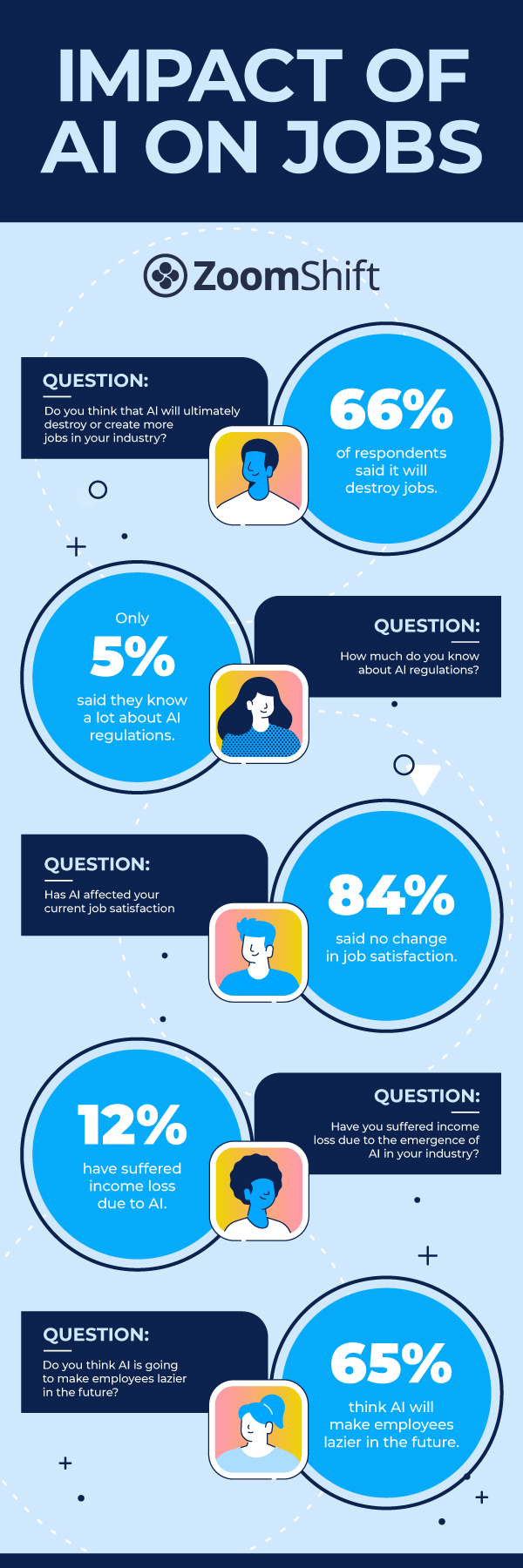
Final Thoughts
This survey was conducted by ZoomShift, an all-in-one employee scheduling platform.
We simplify the process of creating and managing work schedules, enhancing staff accountability, and reducing time spent on payroll tasks.
ZoomShift offers a full range of features and no matter the industry, ZoomShift’s got a solution. See how ZoomShift could help your business from the industries served.
Find the survey interesting? Feel free to share it with others—just link back to our site to credit our researchers!
JD enjoys teaching people how to use ZoomShift to save time spent on scheduling. He’s curious, likes learning new things everyday and playing the guitar (although it’s a work in progress).
